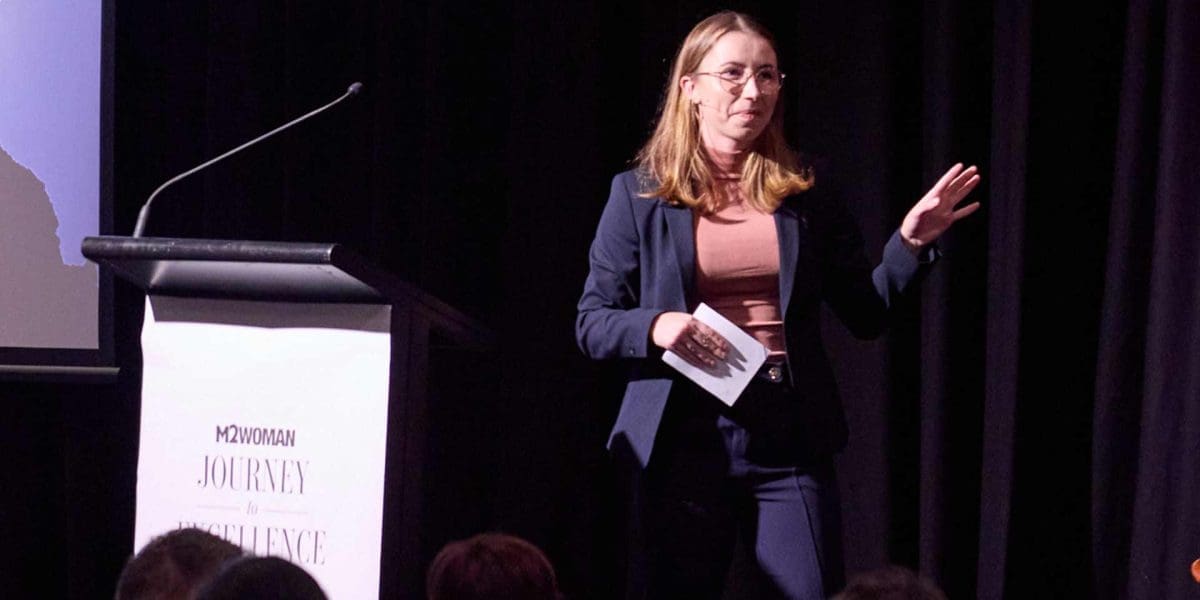Movement as the Language of Resilience
Mariele Klering – Movement as the Language of Resilience
Mariele Klering stood on the Journey to Excellence stage to share a deeply personal story about resilience. But she quickly made it clear that this was not going to be a theoretical discussion. “What do you do when thinking stops helping? When your mind turns against you? When all your usual ways of coping just stop working? That was me during one of the darkest chapters of my life,” she said.
She explained that she had always believed in pushing through with sheer willpower. “I thought if I stayed strong enough, thought hard enough, kept pushing forward, I would be okay. But then it came the moment when thinking stopped helping, and my mind became the thing I needed saving from.” That was when she learned that “resilience isn’t just about how you think, it’s about how you move.”
Her story began in Brazil, where she was burnt out, exhausted, and feeling like “just another number” at work. Even sleep offered no escape, with nightmares about making mistakes at work. Then came a call from a friend offering her a role on a big project in New Zealand. “For the first time in a long time, I felt important,” she said.
The move to New Zealand was exciting but isolating. “Being the only woman in a big technical project left me feeling lonely and homesick. Then 2020 hit and with lockdown I was even more isolated. And then I got the call that I will never forget. My dad had suddenly passed away. There were no flights. No way for me to go home. Everything went dark.”
A self-defence class at a jiu-jitsu school became the turning point. At first she resisted. “It looked intense, aggressive, and super male-dominated. Who am I to be doing this? I’m little. I’m going to get hurt.” But when she walked in, she met Patricia, a world champion and one of the school’s owners. “She saw my pain and made space for me. She showed me how to fall and how to get back up again.”
Those early classes were hard. “Many days I would park my car at the gym, but instead of getting out, I would drive back home telling myself I wasn’t ready.” Then her sensei said something that cut through the noise in her head: “Life is not going to get easier. You need to get stronger.” That moment, she said, quieted her self-doubt and gave her a way forward. “You don’t need to walk away from this. You just need to move through it.”
Jiu-jitsu gave her a break from her thoughts. “For 60 minutes on that mat, my mind finally went quiet. I wasn’t stuck in guilt about losing my dad. Everything slowed down. In that quiet, I found strength.” That strength gave her the courage to leave IT, start writing a book, and speak up in meetings.
“I used to believe I could think my way through anything. Now I know you don’t build resilience by thinking about it. You build it by stepping straight into the thing you want to avoid and realising you’re stronger than you thought.”
She backed her story with science, noting that “sitting for about 10 hours a day cranks up your odds of depressive symptoms by roughly 40%” and that just “one hour of deliberate movement a week could have prevented one in eight cases of depression.”
Her framework for learning the “language of resilience” mirrors learning any new language: start with a word (one movement your body wants), form sentences (create a ritual), and reach fluency (do it even on the days you do not feel like it). “Your mind will fight against you. Feeling resistance means you are on the edge of something important.”
She closed with a challenge: “You don’t build resilience by thinking about it. You build it by stepping straight into the thing you want to avoid. Sometimes all it takes is a little movement.”
Action Points from Mariele Klering’s Keynote
- Recognise when thinking is no longer helping and take action through movement.
- Start with one movement your body wants, even if your mind resists.
- Create a ritual around that movement to build consistency.
- Do it on the days you least feel like it.
- Use movement to quiet the mind and create mental space.
- See resistance as a sign you are on the edge of growth.
- Apply science-backed insight: even small amounts of movement improve mental health.
- Remember that resilience is learned through doing, not overthinking.
